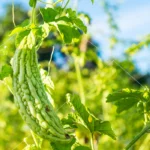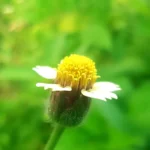Introduction – Companion Planting: Why Flowers Are Essential in a Vegetable Garden

Importance of Flowers in a Vegetable Garden
Flowers play an essential role in a vegetable garden. They are not just beautiful, but they can also benefit vegetable crops in numerous ways. In this article, we will discuss the importance of flowers in a vegetable garden and how they can help improve the yield and quality of your harvest.
Benefits of Growing Flowers in a Vegetable Garden
Growing flowers in a vegetable garden has several benefits. Flowers can attract pollinators and beneficial insects, help control pests, improve soil health, and enhance the beauty of your garden.
Overview of the Article
In this article, we will explore how flowers help vegetable gardens, how to choose flowers for your vegetable garden, and how to care for them. We will also give examples of the best flowers to grow in a vegetable garden.
Flower Power: How Adding Blooms to Your Vegetable Garden Can Boost Your Harvest
Pollination
Pollination is the process by which plants reproduce. Most vegetable plants require pollination to produce fruit. Flowers attract bees, butterflies, and other pollinators that help transfer pollen from the male to the female flower, leading to fruit development. By planting flowers in your vegetable garden, you increase the chances of pollination, leading to a more abundant and healthier harvest.
Attracting Beneficial Insects
Many insects are beneficial to vegetable gardens, such as ladybugs, lacewings, and hoverflies. These insects prey on pests that can damage your vegetable crops. Flowers can attract these beneficial insects to your garden, creating a natural pest control system.
Pest Control
Some flowers have natural repellent properties that can help control pests in a vegetable garden. For example, marigolds have a strong smell that repels pests like nematodes and whiteflies.
Soil Health
Flowers can help improve soil health by increasing organic matter, improving soil structure, and attracting beneficial microorganisms. This, in turn, can lead to healthier vegetable plants and a more abundant harvest.
Companion Planting
Companion planting is the practice of growing different plants together to benefit each other. Flowers can be excellent companions to vegetables, providing shade, attracting beneficial insects, and repelling pests. For example, planting marigolds alongside tomatoes can help deter pests like nematodes.
Choosing Flowers for Your Vegetable Garden
Factors to Consider When Choosing Flowers
When choosing flowers for your vegetable garden, consider factors such as the growing conditions, the flower’s bloom time, and its attraction to pollinators and beneficial insects.
List of Flowers to Grow in a Vegetable Garden
Here are some flowers that can be grown in a vegetable garden, along with their benefits:
Marigold
Marigolds are easy to grow and provide many benefits to your vegetable garden. They are known for their pest-repelling qualities, helping to keep away harmful insects such as aphids and whiteflies.

Marigolds also attract beneficial insects such as ladybugs and lacewings, which feed on pests like aphids and spider mites. They are also good at suppressing weeds and adding vibrant color to your garden.
Nasturtium
Nasturtiums are another great choice for your vegetable garden.

Their leaves and flowers are both edible and have a peppery taste that can add flavor to salads and other dishes. Nasturtiums attract pollinators like bees and butterflies, and they also repel aphids and squash bugs.
Calendula
Calendula is a beautiful flower that can add a pop of color to your vegetable garden.

It is also known for its medicinal properties and can be used to make salves and teas to treat skin irritations and other ailments. Calendula attracts beneficial insects such as hoverflies and ladybugs, which feed on aphids and other pests.
Sunflower
Sunflowers are not only beautiful, but they can also provide many benefits to your vegetable garden.

They attract bees and other pollinators, which can help improve the yield of your crops. Sunflowers also have deep roots that can help break up compacted soil, improving water and nutrient absorption for your vegetables.
Borage
Borage is a versatile flower that can be used for medicinal purposes, as a culinary herb, and to attract beneficial insects.

Its bright blue flowers attract bees, and its leaves can be used to make a tea that is said to have anti-inflammatory properties.
Zinnia
Zinnias come in a wide range of colors and can add a beautiful touch to your vegetable garden.

They attract butterflies and other pollinators and are also good at repelling harmful insects such as Japanese beetles and aphids.
Cosmos
Cosmos are another beautiful flower that can attract pollinators and add color to your garden.

They are also good at repelling harmful insects such as aphids and thrips.
Daisies
Daisies are charming flowers that add a touch of whimsy to any garden, and they also serve a practical purpose in a vegetable garden. They attract beneficial insects such as ladybugs, lacewings, and hoverflies, which help control pest populations. Daisies prefer full sun and well-draining soil, and they can tolerate a range of soil pH levels.

They bloom in the summer and fall, and their cheerful blooms can be white, pink, yellow, or red. Plant them around the edges of your vegetable garden or intersperse them among your crops for a burst of color and a boost to your garden’s health.
Lavender
Lavender is an herb that’s beloved for its fragrant purple blooms and its ability to attract pollinators such as bees, butterflies, and hummingbirds. It’s also a natural pest repellent that can help keep mosquitoes, moths, and other pests at bay.

Lavender prefers full sun and well-draining soil, and it can tolerate a range of soil pH levels. It blooms in the summer and early fall, and its fragrant flowers can be used for culinary purposes, such as in teas, desserts, and savory dishes. Plant it near your vegetable garden to add beauty and functionality to your space.
Sweet Alyssum
Sweet alyssum is a low-growing annual flower that’s perfect for edging a vegetable garden or filling in empty spaces. It attracts beneficial insects such as lacewings, hoverflies, and parasitic wasps, which help control pest populations. Sweet alyssum prefers full sun and well-draining soil, and it can tolerate a range of soil pH levels.

It blooms in the spring and fall, and its dainty white or purple flowers add a delicate beauty to any garden. Plant it around the edges of your vegetable garden or interplant it among your crops to improve your garden’s health and beauty.
Caring for Flowers in a Vegetable Garden
When it comes to caring for flowers in a vegetable garden, there are several key factors to keep in mind to ensure their health and vitality.
Watering and Fertilization
Proper watering and fertilization are critical to the health of your flower plants. Most flowering plants require consistent watering, usually about 1-2 inches per week. However, it is important not to overwater, as this can lead to root rot and other issues. It is also important to fertilize your flower plants regularly with a balanced fertilizer, such as a 10-10-10 formula. This will help ensure that they have the necessary nutrients to thrive.
Deadheading and Pruning
Deadheading is the process of removing spent blooms from your flowers, which not only improves their appearance but also encourages new growth and additional blooms. Pruning is also important for keeping your plants healthy and shapely. For example, cutting back certain types of plants can encourage bushier growth and more blooms. Be sure to research the specific needs of each type of flower in your garden to determine the best pruning techniques.
Pest and Disease Control
Just like your vegetable plants, your flower plants may also be vulnerable to pests and diseases. Common flower pests include aphids, spider mites, and whiteflies, while common diseases include powdery mildew and rust. To keep your flowers healthy, it is important to stay vigilant and address any pest or disease issues as soon as possible. You can use natural remedies such as neem oil or insecticidal soap, or opt for chemical treatments if necessary.
Harvesting Flowers
Finally, it is important to know when and how to harvest your flowers. This not only ensures that you can enjoy them inside your home, but it can also encourage new growth and additional blooms. Some flowers, such as zinnias and marigolds, can be harvested as soon as they start to bloom, while others, such as sunflowers and daisies, are best harvested when they are fully open. Be sure to research the specific needs of each type of flower in your garden to determine the best harvesting techniques.
Common mistakes to avoid when planting flowers in a vegetable garden
When planting flowers in your vegetable garden, there are common mistakes that should be avoided to ensure the success of your garden. Here are some of the most common mistakes:
Overcrowding:
It is easy to get carried away with planting flowers and end up overcrowding your garden. Overcrowding can lead to poor air circulation, which can result in increased disease and pest problems. It can also lead to competition for nutrients and water among your plants, which can cause stunted growth and reduced yields. To avoid overcrowding, make sure to follow spacing recommendations for each flower variety and consider the mature size of each plant when deciding where to plant.
Planting inappropriate flowers:
Another common mistake is planting inappropriate flowers that may not thrive in the growing conditions of your vegetable garden. It is important to choose flowers that are suited to the soil type, sun exposure, and climate of your garden. For example, if your garden has poor drainage, it may not be suitable for flowers that require well-drained soil. Make sure to research the specific growing requirements of each flower variety before planting.
Poor timing of planting:
Timing is crucial when planting flowers in your vegetable garden. Planting too early or too late can result in poor growth and reduced yields. Make sure to plant flowers at the appropriate time for your climate and the specific flower variety. Consult planting guides or local gardening experts for recommendations on the best planting times for your area.
By avoiding these common mistakes, you can ensure a successful flower garden in your vegetable garden, providing not only beauty but also important benefits to your garden’s overall health and productivity.
Best practices for planting and maintaining flowers in a vegetable garden
Flowers can be a valuable addition to a vegetable garden, not just for their beauty but also for their ability to attract pollinators and beneficial insects. To ensure that your flowers thrive and contribute to the health of your garden, it’s important to follow best practices for planting and maintenance. Here are some tips:
Soil preparation:
Before planting flowers, it’s important to prepare the soil. The soil should be well-draining and rich in organic matter. You can amend the soil with compost or well-rotted manure to improve its fertility. It’s also a good idea to test the soil pH to ensure it’s within the appropriate range for the flowers you plan to grow.
Watering and fertilization:
Flowers in a vegetable garden require regular watering, especially during hot and dry weather. It’s important to provide consistent moisture without overwatering, which can lead to root rot. Mulching around the flowers can help retain moisture in the soil. In terms of fertilization, flowers generally benefit from regular applications of a balanced, slow-release fertilizer.
Pest management:
Flowers in a vegetable garden can be susceptible to pests and diseases, which can spread to your vegetables. It’s important to monitor your flowers regularly for signs of infestation and take action if necessary. This can include removing affected leaves or using organic pest control methods, such as neem oil or insecticidal soap. Planting flowers that attract beneficial insects, such as ladybugs and lacewings, can also help to control pests.
By following these best practices, you can ensure that the flowers in your vegetable garden not only look beautiful but also contribute to the overall health of your garden.
Conclusion
In conclusion, planting flowers in your vegetable garden can offer numerous benefits, including increased pollination and pest control, improved aesthetics, and even enhanced vegetable yields. By choosing the right flowers for your garden, ensuring proper care and maintenance, and avoiding common mistakes, you can create a beautiful and thriving garden that provides both beauty and bounty.
We hope this guide has provided you with valuable insights and inspiration for incorporating flowers into your vegetable garden. As you embark on this journey, keep in mind the importance of proper soil preparation, watering and fertilization, and pest management practices. By following these best practices and dedicating time and effort to your garden, you can reap the rewards of a flourishing and fruitful garden.
Planting flowers in your vegetable garden can be a rewarding and enriching experience, both for your senses and your stomach. With a little bit of planning and care, you can create a stunning and productive garden that brings joy and nourishment to your life. Happy planting!
In addition to the valuable information shared in this article, we would also like to draw your attention to our product web store, www.shehrikisaan.com. We understand that planting flowers in a vegetable garden requires the right kind of care and attention, which is why we have carefully curated a selection of fertilizers and growth promoters to support the growth of flowering varieties in Indian growing conditions.
Our fertilizers and growth promoters are of the highest quality, chosen specifically for their effectiveness in supporting the growth of flowers in a vegetable garden. Whether you are a farmer or a home gardener, our products are designed to provide the essential nutrients and minerals needed to produce healthy, vibrant flowers.
At www.shehrikisaan.com, we are committed to providing our customers with the best possible products and services. We believe that by offering the right kind of support, we can help our customers to achieve their gardening goals and enjoy the beauty of a flourishing vegetable garden filled with a variety of colorful flowers.
We invite you to explore our product web store and discover the range of fertilizers and growth promoters that we have available. If you have any questions or need further assistance, our team of experts is always on hand to provide guidance and support. Thank you for choosing www.shehrikisaan.com as your trusted partner for all your gardening needs.







